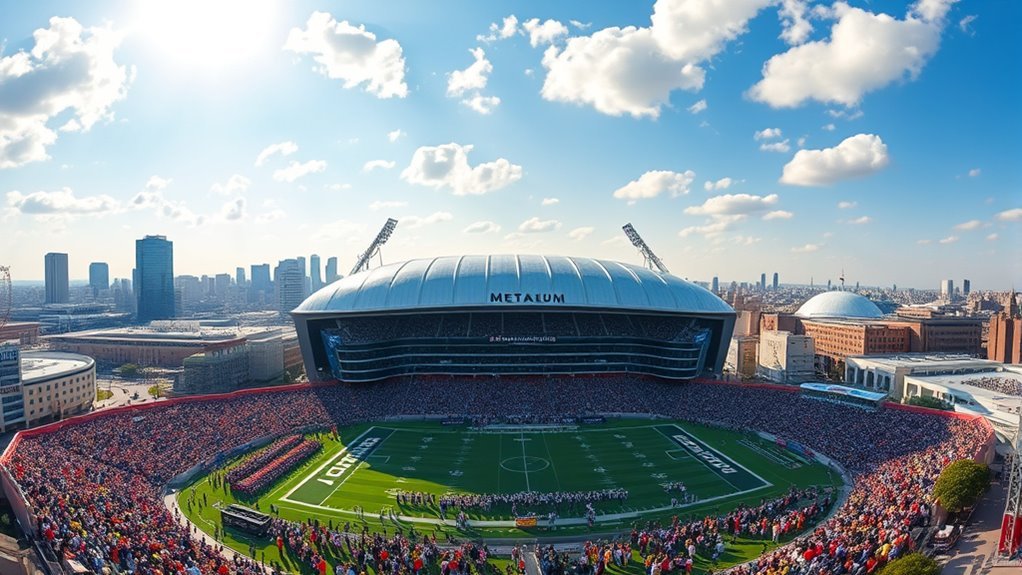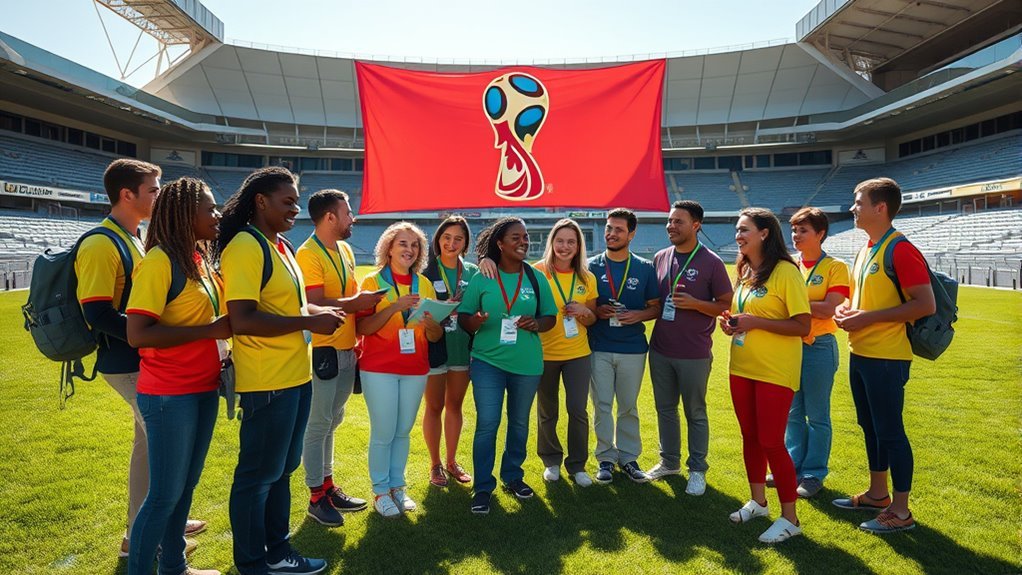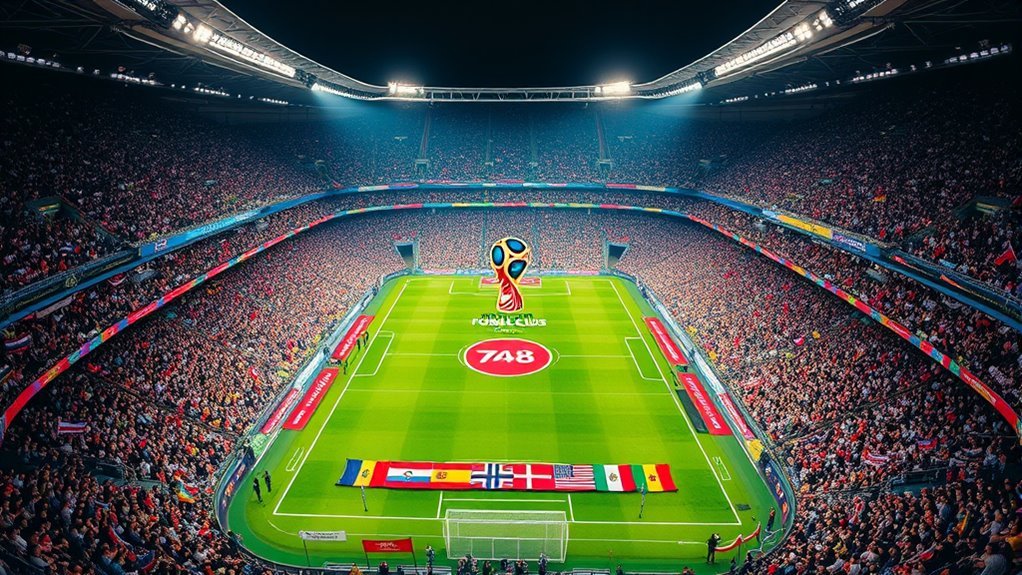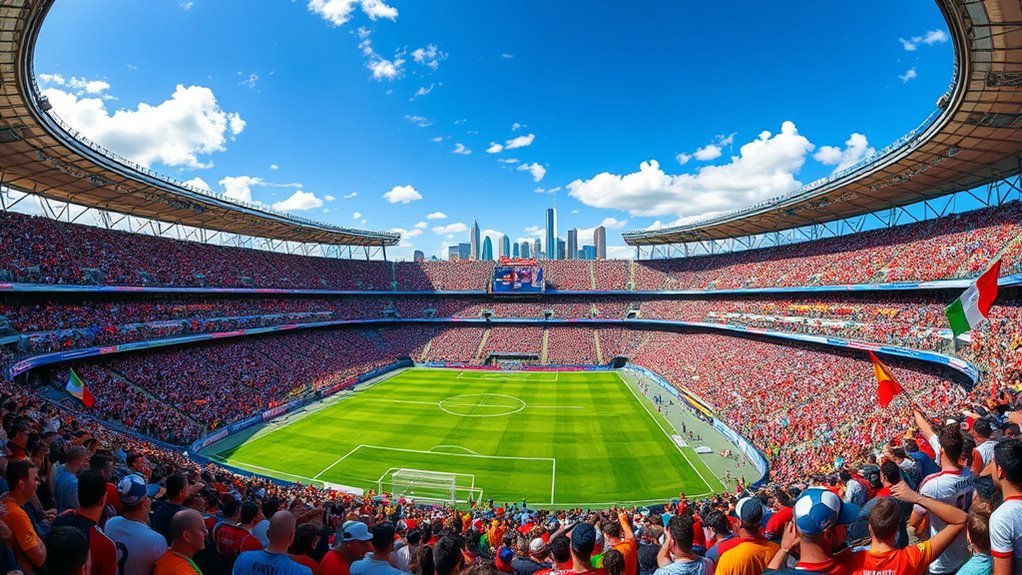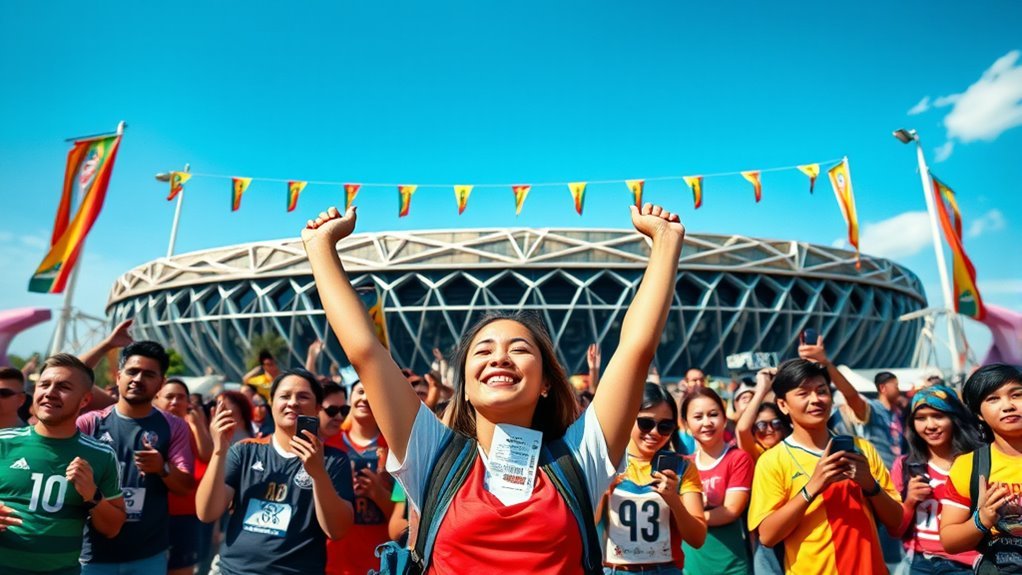The FIFA 2026 World Cup final will be held in North America, as the tournament is a historic collaboration between the United States, Canada, and Mexico. This marks the first time three countries are joining forces to host the event. With an expanded format featuring 48 teams, the final promises excitement and unity through soccer. If you want to know more about the venues and what to expect, there’s plenty to explore!
Overview of the FIFA 2026 World Cup
As the excitement builds for the FIFA 2026 World Cup, you can expect a tournament like no other, as it marks the first time the event will be hosted by three countries: the United States, Canada, and Mexico. This unique collaboration not only showcases the passion for soccer but also emphasizes the spirit of unity and freedom among nations. The World Cup is set to make a significant global impact, drawing fans from around the world to celebrate their love for the game.
With an expanded format featuring 48 teams, the tournament promises thrilling matches and unforgettable moments. Imagine the diverse cultures converging in stadiums filled with energy, as communities unite in the name of sport. This World Cup is more than just a competition; it’s a celebration of freedom, diversity, and the unbreakable bond formed through the love of soccer. Gear up for an experience that transcends borders!
Criteria for Selecting the Host City
When it comes to selecting the host city for the FIFA 2026 World Cup, several key criteria play an essential role. You’ll want to take into account infrastructure and facilities, ensuring they can accommodate fans and teams alike. Additionally, fan accessibility and climate conditions can greatly impact the overall experience, making them important factors in the decision-making process.
Infrastructure and Facilities
Selecting a host city for the FIFA 2026 World Cup hinges greatly on its infrastructure and facilities. You want seamless transportation logistics to guarantee fans can easily reach stadiums with ample capacity. Consider the accommodation options: the more available, the better. Security measures must be excellent to create a safe environment for everyone. Plus, technology integration can enhance the overall experience, making it more enjoyable and interactive. Community involvement is vital, as local partnerships can foster excitement and engagement. Don’t overlook sustainability initiatives, which demonstrate a commitment to the environment. Last but not least, effective event management is essential to handle the influx of visitors, making sure everything runs smoothly and efficiently.
Fan Accessibility and Experience
Given the significance of fan engagement, the accessibility and experience offered in the host city for the FIFA 2026 World Cup must be exceptional. You want to enjoy every moment, and that means easy access to venues and amenities. The ideal host city should prioritize fan accessibility to enhance your viewing experience.
| Accessibility Feature | Importance | Benefit |
|---|---|---|
| Public Transport | High | Quick access to stadiums |
| ADA Compliance | High | Inclusive experience for all fans |
| Proximity to Hotels | Medium | Convenient accommodation options |
| Fan Zones | High | Social interaction and entertainment |
| Affordable Options | Medium | Broadens participation and enjoyment |
These elements can transform your World Cup journey into a memorable celebration of freedom and camaraderie.
Climate and Weather Considerations
A fantastic fan experience goes beyond just accessibility; it also hinges on the climate and weather conditions during the tournament. When choosing a host city, you’ve gotta consider climate impact and how weather patterns can affect gameplay and enjoyment. Temperature extremes can make or break the atmosphere, so seasonal considerations are essential. You don’t want fans sweltering in the heat or shivering in the cold. Environmental factors also play a role in ensuring a sustainable event. Cities with strong climate adaptability can handle unexpected weather, keeping the focus on the game and the fans. So, as you think about where the final might be, remember that the right climate can create unforgettable memories for everyone involved.
Major Contenders for the Final Match
Who are the teams that could make a splash in the FIFA 2026 World Cup final? As you gear up for the excitement, several contenders are shaping up to be fierce competitors. Their team dynamics and tactical strategies will play a vital role in determining who advances. Here are some major candidates to watch:
- Brazil: Known for their flair and skill, they’re always a favorite.
- Germany: With a rich history, their disciplined approach often leads them far.
- France: A powerhouse with a blend of youth and experience, they’re tough to beat.
- Argentina: Their passionate play and strong teamwork can surprise any opponent.
As you follow the tournament, keep an eye on how these teams adapt their strategies and maintain their dynamics, as it could make all the difference in reaching that coveted final match.
Historical Significance of Each Candidate
Each of the major contenders for the FIFA 2026 World Cup final carries a rich historical significance that shapes their current identities. You can’t ignore the historical milestones that each city holds, from iconic matches to legendary players who’ve graced their fields. For instance, cities like New York and Los Angeles have not only hosted World Cup games in the past but have also been epicenters of cultural legacy, blending sports with the vibrant tapestry of life.
As you consider these candidates, think about how their histories reflect the spirit of freedom and unity that football embodies. The passion and pride of their communities resonate deeply, reminding us that these venues are more than just stadiums—they’re symbols of dreams, aspirations, and the joy of the beautiful game. Ultimately, the choice of the final venue will celebrate these historical narratives, enriching the tournament’s legacy.
Infrastructure and Venue Readiness
While the history of a city enhances its appeal as a World Cup final venue, the state of its infrastructure and venue readiness is essential for a successful tournament. You’ll want to take into account several factors when evaluating venue selection and transportation logistics:
The success of a World Cup final hinges on a city’s infrastructure and venue readiness, ensuring an unforgettable experience for fans.
- Stadium capacity: It needs to accommodate thousands of fans, guaranteeing everyone can enjoy the match.
- Accessibility: Easy access to venues by public transport is imperative for smooth movement.
- Accommodations: Sufficient hotels and lodging options allow fans to stay comfortably.
- Technology: Advanced facilities and connectivity can enhance the overall experience.
Cities must address these elements to create an environment where excitement thrives. If they can provide effective transportation logistics and confirm venues are up to standard, the World Cup final will be an unforgettable celebration of sport and unity.
Fan Engagement and Experience
How can cities create an unforgettable atmosphere for fans during the FIFA 2026 World Cup? It’s all about embracing the spirit of the game and weaving together interactive experiences that resonate with everyone. Imagine vibrant fan zones filled with live music, food trucks, and art that celebrates local culture. These spaces can become hubs where you connect with fellow fans, share stories, and celebrate the beautiful game together.
Cities should actively seek fan feedback to shape these experiences. What do you want to see? What activities would make your visit special? By involving fans in the planning process, cities can guarantee that every moment is tailored to your desires.
From immersive technology that brings you closer to the action to engaging activities that spark camaraderie, the goal is to foster a lively, inclusive environment. Ultimately, it’s about creating memories that’ll last long after the final whistle.
Economic Impact on Host Cities
As the FIFA 2026 World Cup approaches, the economic impact on host cities is becoming a hot topic. You’ll see job creation opportunities springing up, along with significant infrastructure development benefits. These changes could reshape the local economies for years to come.
Job Creation Opportunities
The FIFA 2026 World Cup is expected to generate thousands of job opportunities in host cities, greatly boosting local economies. This event will enhance the job market, driving employment growth and skill development. Here’s how:
- Event Staffing: Numerous temporary jobs will pop up for event coordination, security, and hospitality.
- Tourism Boost: Increased visitors will create demand for services, fueling local businesses.
- Community Involvement: Local residents can engage in various roles, fostering a sense of pride and ownership.
- Skill Development: Workers will gain valuable experience, enhancing their employability for the future.
This influx of job creation not only strengthens the local economy but also encourages community spirit and collaboration among residents. Embrace the opportunity!
Infrastructure Development Benefits
Alongside job creation, the FIFA 2026 World Cup will catalyze significant infrastructure development in host cities. You’ll witness sustainable development that not only enhances facilities but also drives urban renewal. Transportation upgrades will improve accessibility, making it easier for everyone to engage with their communities and enjoy the festivities. This investment in infrastructure promotes economic revitalization, paving the way for increased tourism growth and long-lasting benefits. As cities come together to host the world, social cohesion will strengthen, uniting diverse populations through a shared passion for the game. Ultimately, this event isn’t just about soccer; it’s about building a better future for all, fostering community engagement, and creating a vibrant, interconnected urban environment that lasts long after the final whistle.
Previous World Cup Final Locations
While many fans enthusiastically anticipate the FIFA 2026 World Cup, it’s fascinating to look back at previous final locations that have hosted this prestigious event. These historic venues have witnessed some of the most notable matches in football history, creating unforgettable memories for fans around the world.
Here are four iconic World Cup final locations:
- Maracanã Stadium, Brazil (1950 & 2014): Known for its electric atmosphere.
- Wembley Stadium, England (1966): The site of England’s only World Cup triumph.
- Stade de France, France (1998 & 2006): Where Zidane shone in 1998.
- FNB Stadium, South Africa (2010): Marked the first World Cup on African soil.
Each of these venues not only showcased thrilling matches but also represented the spirit of unity and freedom that football embodies. As you reflect on these moments, you can’t help but feel the excitement building for the next tournament.
Predictions and Speculations
As we look ahead to the FIFA 2026 World Cup Final, it’s exciting to contemplate how host cities, team performance, and fan engagement might shape the outcome. You might wonder which cities are better positioned to make a lasting impression and how the teams’ current trends could influence their chances. Plus, the energy and support from fans could tip the scales in unexpected ways.
Host Cities Analysis
The FIFA 2026 World Cup will take place in three countries, and with 16 cities vying for the spotlight, the competition to host the final is heating up. Cities like New York, Los Angeles, and Toronto bring not just state-of-the-art stadiums but also rich cultural significance. When considering stadium selection, a few factors come into play:
- Infrastructure and accessibility
- Capacity to host large crowds
- Local fan engagement and passion
- Historical relevance and cultural ties
Each city has unique advantages, but it’s essential to weigh these elements carefully. Ultimately, the choice will reflect a balance between logistical needs and the spirit of the game, ensuring the final is a celebration of freedom and unity.
Team Performance Trends
Given the evolving dynamics of international football, analyzing team performance trends for the FIFA 2026 World Cup can offer valuable insights. You’ll want to pay close attention to team dynamics and player statistics as they reveal how squads adapt to challenges. Tactical analysis will help you understand match strategies and how coaching influence shapes gameplay. Watch for momentum shifts that can alter a match’s outcome, as well as the impacts of injuries on key players. Historical performance can provide context, but don’t underestimate the role of team morale in driving success. As you explore these factors, you’ll gain a clearer picture of which teams could rise above the competition in the upcoming tournament.
Fan Engagement Factors
Understanding team performance trends provides a backdrop for examining how fan engagement factors will shape the FIFA 2026 World Cup experience. As you look ahead, consider how interactive experiences will elevate your connection to the game. You can expect:
- Enhanced mobile apps for real-time updates and stats
- Virtual reality zones that bring the action closer to home
- Social media integrations for engaging in live discussions
- Tailored experiences based on your favorite teams and players
These elements will not only enrich your enjoyment but also foster a sense of community among fans. As the tournament approaches, it’s exciting to think about how these innovations will redefine your experience, making it truly unforgettable. Get ready to plunge into a world where fan engagement takes the spotlight!
The Decision-Making Process
While selecting the location for the FIFA 2026 World Cup final, various factors play a crucial role in the decision-making process. You’ll find that the decision criteria are diverse, reflecting the needs of fans, teams, and organizers alike. The selection process involves evaluating venues based on capacity, infrastructure, and local support.
| Criteria | Importance |
|---|---|
| Venue Capacity | Essential for fan engagement |
| Transportation Access | Critical for travel ease |
| Local Support | Influences overall atmosphere |
These elements guarantee that the final isn’t just about the game; it’s about creating an unforgettable experience. As you can see, each factor’s weight contributes to the overall appeal, shaping the heart of this monumental event. Ultimately, this collaborative approach aims to celebrate the spirit of football while embracing the freedom and joy it brings.
Frequently Asked Questions
Will There Be a Fan Zone at the Final Match Location?
Yes, there’ll be a fan zone at the final match location, enhancing your fan experience. You’ll enjoy viewing parties, lively activities, and a chance to celebrate with fellow fans, creating unforgettable memories together.
What Is the Expected Ticket Price Range for the Final?
You’ll probably need to sell a kidney for those final tickets! With crazy ticket demand, expect pricing strategies to range wildly, from a few hundred to several thousand dollars, depending on your luck and connections.
How Can Fans Access Transportation to the Final Venue?
You can access the final venue using public transport or ride sharing options. Check local transit schedules and rideshare apps to find convenient routes, ensuring you enjoy the freedom of getting there hassle-free.
Will There Be Any Special Events Leading up to the Final?
You bet there’ll be pre-final festivities! Expect celebrity appearances galore—because who doesn’t want to see stars pretending to care about soccer? Just remember, freedom’s best enjoyed with a drink in hand and a laugh!
What Safety Measures Will Be Implemented for the Final Match?
For the final match, expect strict security protocols and health screenings to guarantee everyone’s safety. While you’ll enjoy the atmosphere, these measures will help maintain a secure environment, allowing you to freely celebrate the event.
